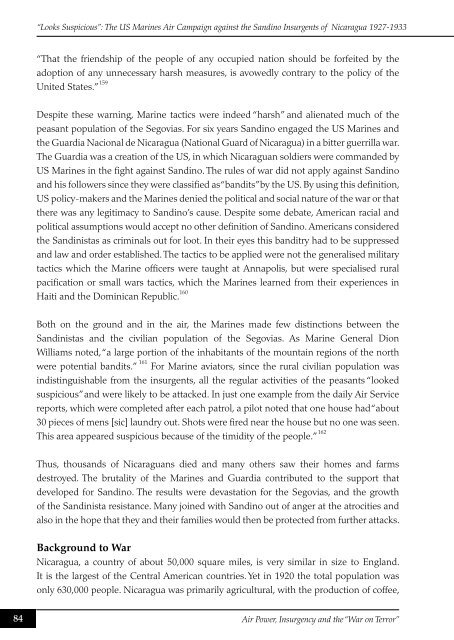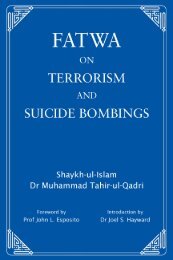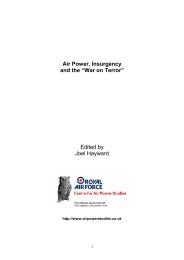Air Power, Insurgency and the âWar on Terrorâ - Prof. Joel Hayward's ...
Air Power, Insurgency and the âWar on Terrorâ - Prof. Joel Hayward's ...
Air Power, Insurgency and the âWar on Terrorâ - Prof. Joel Hayward's ...
Create successful ePaper yourself
Turn your PDF publications into a flip-book with our unique Google optimized e-Paper software.
“Looks Suspicious”: The US Marines <str<strong>on</strong>g>Air</str<strong>on</strong>g> Campaign against <str<strong>on</strong>g>the</str<strong>on</strong>g> S<str<strong>on</strong>g>and</str<strong>on</strong>g>ino Insurgents of Nicaragua 1927-1933<br />
“That <str<strong>on</strong>g>the</str<strong>on</strong>g> friendship of <str<strong>on</strong>g>the</str<strong>on</strong>g> people of any occupied nati<strong>on</strong> should be forfeited by <str<strong>on</strong>g>the</str<strong>on</strong>g><br />
adopti<strong>on</strong> of any unnecessary harsh measures, is avowedly c<strong>on</strong>trary to <str<strong>on</strong>g>the</str<strong>on</strong>g> policy of <str<strong>on</strong>g>the</str<strong>on</strong>g><br />
United States.” 159<br />
Despite <str<strong>on</strong>g>the</str<strong>on</strong>g>se warning, Marine tactics were indeed “harsh” <str<strong>on</strong>g>and</str<strong>on</strong>g> alienated much of <str<strong>on</strong>g>the</str<strong>on</strong>g><br />
peasant populati<strong>on</strong> of <str<strong>on</strong>g>the</str<strong>on</strong>g> Segovias. For six years S<str<strong>on</strong>g>and</str<strong>on</strong>g>ino engaged <str<strong>on</strong>g>the</str<strong>on</strong>g> US Marines <str<strong>on</strong>g>and</str<strong>on</strong>g><br />
<str<strong>on</strong>g>the</str<strong>on</strong>g> Guardia Naci<strong>on</strong>al de Nicaragua (Nati<strong>on</strong>al Guard of Nicaragua) in a bitter guerrilla war.<br />
The Guardia was a creati<strong>on</strong> of <str<strong>on</strong>g>the</str<strong>on</strong>g> US, in which Nicaraguan soldiers were comm<str<strong>on</strong>g>and</str<strong>on</strong>g>ed by<br />
US Marines in <str<strong>on</strong>g>the</str<strong>on</strong>g> fight against S<str<strong>on</strong>g>and</str<strong>on</strong>g>ino. The rules of war did not apply against S<str<strong>on</strong>g>and</str<strong>on</strong>g>ino<br />
<str<strong>on</strong>g>and</str<strong>on</strong>g> his followers since <str<strong>on</strong>g>the</str<strong>on</strong>g>y were classified as “b<str<strong>on</strong>g>and</str<strong>on</strong>g>its” by <str<strong>on</strong>g>the</str<strong>on</strong>g> US. By using this definiti<strong>on</strong>,<br />
US policy-makers <str<strong>on</strong>g>and</str<strong>on</strong>g> <str<strong>on</strong>g>the</str<strong>on</strong>g> Marines denied <str<strong>on</strong>g>the</str<strong>on</strong>g> political <str<strong>on</strong>g>and</str<strong>on</strong>g> social nature of <str<strong>on</strong>g>the</str<strong>on</strong>g> war or that<br />
<str<strong>on</strong>g>the</str<strong>on</strong>g>re was any legitimacy to S<str<strong>on</strong>g>and</str<strong>on</strong>g>ino’s cause. Despite some debate, American racial <str<strong>on</strong>g>and</str<strong>on</strong>g><br />
political assumpti<strong>on</strong>s would accept no o<str<strong>on</strong>g>the</str<strong>on</strong>g>r definiti<strong>on</strong> of S<str<strong>on</strong>g>and</str<strong>on</strong>g>ino. Americans c<strong>on</strong>sidered<br />
<str<strong>on</strong>g>the</str<strong>on</strong>g> S<str<strong>on</strong>g>and</str<strong>on</strong>g>inistas as criminals out for loot. In <str<strong>on</strong>g>the</str<strong>on</strong>g>ir eyes this b<str<strong>on</strong>g>and</str<strong>on</strong>g>itry had to be suppressed<br />
<str<strong>on</strong>g>and</str<strong>on</strong>g> law <str<strong>on</strong>g>and</str<strong>on</strong>g> order established. The tactics to be applied were not <str<strong>on</strong>g>the</str<strong>on</strong>g> generalised military<br />
tactics which <str<strong>on</strong>g>the</str<strong>on</strong>g> Marine officers were taught at Annapolis, but were specialised rural<br />
pacificati<strong>on</strong> or small wars tactics, which <str<strong>on</strong>g>the</str<strong>on</strong>g> Marines learned from <str<strong>on</strong>g>the</str<strong>on</strong>g>ir experiences in<br />
Haiti <str<strong>on</strong>g>and</str<strong>on</strong>g> <str<strong>on</strong>g>the</str<strong>on</strong>g> Dominican Republic. 160<br />
Both <strong>on</strong> <str<strong>on</strong>g>the</str<strong>on</strong>g> ground <str<strong>on</strong>g>and</str<strong>on</strong>g> in <str<strong>on</strong>g>the</str<strong>on</strong>g> air, <str<strong>on</strong>g>the</str<strong>on</strong>g> Marines made few distincti<strong>on</strong>s between <str<strong>on</strong>g>the</str<strong>on</strong>g><br />
S<str<strong>on</strong>g>and</str<strong>on</strong>g>inistas <str<strong>on</strong>g>and</str<strong>on</strong>g> <str<strong>on</strong>g>the</str<strong>on</strong>g> civilian populati<strong>on</strong> of <str<strong>on</strong>g>the</str<strong>on</strong>g> Segovias. As Marine General Di<strong>on</strong><br />
Williams noted, “a large porti<strong>on</strong> of <str<strong>on</strong>g>the</str<strong>on</strong>g> inhabitants of <str<strong>on</strong>g>the</str<strong>on</strong>g> mountain regi<strong>on</strong>s of <str<strong>on</strong>g>the</str<strong>on</strong>g> north<br />
were potential b<str<strong>on</strong>g>and</str<strong>on</strong>g>its.” 161 For Marine aviators, since <str<strong>on</strong>g>the</str<strong>on</strong>g> rural civilian populati<strong>on</strong> was<br />
indistinguishable from <str<strong>on</strong>g>the</str<strong>on</strong>g> insurgents, all <str<strong>on</strong>g>the</str<strong>on</strong>g> regular activities of <str<strong>on</strong>g>the</str<strong>on</strong>g> peasants “looked<br />
suspicious” <str<strong>on</strong>g>and</str<strong>on</strong>g> were likely to be attacked. In just <strong>on</strong>e example from <str<strong>on</strong>g>the</str<strong>on</strong>g> daily <str<strong>on</strong>g>Air</str<strong>on</strong>g> Service<br />
reports, which were completed after each patrol, a pilot noted that <strong>on</strong>e house had “about<br />
30 pieces of mens [sic] laundry out. Shots were fired near <str<strong>on</strong>g>the</str<strong>on</strong>g> house but no <strong>on</strong>e was seen.<br />
This area appeared suspicious because of <str<strong>on</strong>g>the</str<strong>on</strong>g> timidity of <str<strong>on</strong>g>the</str<strong>on</strong>g> people.” 162<br />
Thus, thous<str<strong>on</strong>g>and</str<strong>on</strong>g>s of Nicaraguans died <str<strong>on</strong>g>and</str<strong>on</strong>g> many o<str<strong>on</strong>g>the</str<strong>on</strong>g>rs saw <str<strong>on</strong>g>the</str<strong>on</strong>g>ir homes <str<strong>on</strong>g>and</str<strong>on</strong>g> farms<br />
destroyed. The brutality of <str<strong>on</strong>g>the</str<strong>on</strong>g> Marines <str<strong>on</strong>g>and</str<strong>on</strong>g> Guardia c<strong>on</strong>tributed to <str<strong>on</strong>g>the</str<strong>on</strong>g> support that<br />
developed for S<str<strong>on</strong>g>and</str<strong>on</strong>g>ino. The results were devastati<strong>on</strong> for <str<strong>on</strong>g>the</str<strong>on</strong>g> Segovias, <str<strong>on</strong>g>and</str<strong>on</strong>g> <str<strong>on</strong>g>the</str<strong>on</strong>g> growth<br />
of <str<strong>on</strong>g>the</str<strong>on</strong>g> S<str<strong>on</strong>g>and</str<strong>on</strong>g>inista resistance. Many joined with S<str<strong>on</strong>g>and</str<strong>on</strong>g>ino out of anger at <str<strong>on</strong>g>the</str<strong>on</strong>g> atrocities <str<strong>on</strong>g>and</str<strong>on</strong>g><br />
also in <str<strong>on</strong>g>the</str<strong>on</strong>g> hope that <str<strong>on</strong>g>the</str<strong>on</strong>g>y <str<strong>on</strong>g>and</str<strong>on</strong>g> <str<strong>on</strong>g>the</str<strong>on</strong>g>ir families would <str<strong>on</strong>g>the</str<strong>on</strong>g>n be protected from fur<str<strong>on</strong>g>the</str<strong>on</strong>g>r attacks.<br />
Background to War<br />
Nicaragua, a country of about 50,000 square miles, is very similar in size to Engl<str<strong>on</strong>g>and</str<strong>on</strong>g>.<br />
It is <str<strong>on</strong>g>the</str<strong>on</strong>g> largest of <str<strong>on</strong>g>the</str<strong>on</strong>g> Central American countries. Yet in 1920 <str<strong>on</strong>g>the</str<strong>on</strong>g> total populati<strong>on</strong> was<br />
<strong>on</strong>ly 630,000 people. Nicaragua was primarily agricultural, with <str<strong>on</strong>g>the</str<strong>on</strong>g> producti<strong>on</strong> of coffee,<br />
84<br />
<str<strong>on</strong>g>Air</str<strong>on</strong>g> <str<strong>on</strong>g>Power</str<strong>on</strong>g>, <str<strong>on</strong>g>Insurgency</str<strong>on</strong>g> <str<strong>on</strong>g>and</str<strong>on</strong>g> <str<strong>on</strong>g>the</str<strong>on</strong>g> “War <strong>on</strong> Terror”





